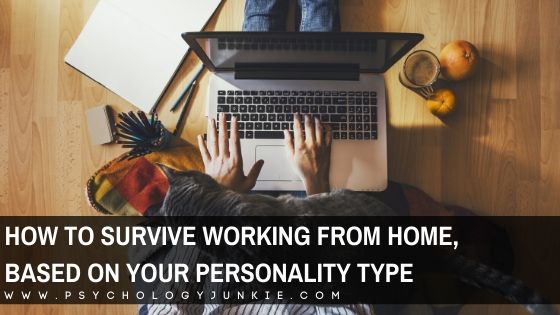How to Survive Working from Home, Based On Your Myers-Briggs® Personality Type
Over the past few weeks, remote work has become the ‘new normal’ for people across the globe. Many professionals and students are having to drastically change their routines and adjust their expectations when it comes to work.
Shifting from slacks and conference rooms to pajamas and coffee table Zoom meetings may initially sound like an oasis. But between keeping family members entertained and finding creative ways to keep a distance between yourself and others, all of the change can be a lot to handle, even for the most novelty-seeking of personality types.

Here’s what you should know: Whatever you’re experiencing right now is OK. It’s normal to miss social interactions with co-workers. It’s also normal to feel anxious with the entire family at home for weeks on end. Every emotional experience during a time of collective uncertainty is valid. But there are ways to manage our emotional experiences more effectively, based on your personality type.
Different personality types will have different experiences in transitioning to working from home. Read on to learn what you may be experiencing right now based on your personality type, and some tips on how to cope.
Not sure what your personality type is? Take our new personality questionnaire here. Or you can take the official MBTI® here.
ESTJs and Working from Home
You are someone who thrives in establishing systems and routines, following through on projects, meeting deadlines and holding people accountable. It may feel like you’re losing a grip on the aspects of your job that used to come second-nature. Uncertainty about the future may cause anxiety, and you’re feeling pressure to overwork to “get things done” and establish a sense of control.
Just because things feel different, it doesn’t mean that you can’t regain a steady grip on what’s happening in your life. Work on establishing new routines and habits to effectively get your work done — without burning yourself out or placing unrealistic expectations on your colleagues or family members. Find a dedicated space to work each day and set up a schedule that allows you to complete your to-do list efficiently.
Communicate your needs with your family so that your work time can be as productive as possible. But don’t forget to make time to get away from your desk and enjoy time with the people in your household, or to check in with other family members, friends and colleagues over phone or video chat. This is a great time to exercise a bit of creativity and flexibility. If you live with other people, plan an at-home ‘night out’ and ask everyone to come prepared with their own activity.
ISTJs and Working from Home
As an ISTJ, hard work and reliability come second-nature to you. You’re used to getting work done, and getting it done right. You appreciate structure and stability. And you may feel like you’re being bombarded with new ideas, strategies, and methods at an overwhelming rate.
Take time to soak in the novelty of the situation and plan your path forward. The patience and focus that you display when learning something new are going to be your greatest assets right now. You may feel like you’re not adapting as quickly as some of your colleagues, but in two weeks you’ll be the expert in all things Zoom, while others still won’t know how to set up their headphones. Your ability to process new data and specialize will be a comforting benefit to everyone — including yourself — in the future.
Now is a time to focus on developing a sense of normalcy. Set up routines and habits that make you feel in control of how you spend your time each day. If you live in a household with other people, make sure they understand your boundaries (i.e., “Mom’s meeting time is between 8:00-10:00 a.m. every day. I can’t leave my desk during that time.”) As an introvert, it’s also important that you also find time to retreat from work and family each week.
ESFJs and Working from Home
It’s fine — you have everything under control, right? That may be what you’re telling people right now, but is that how you’re feeling? As an ESFJ, you strive to support other people. And during a time of collective stress, you may feel even more responsible for maintaining a sense of normalcy for everyone else in your life. But don’t forget there’s someone else who needs some attention at the moment — you!
You may feel like everything in your life is shaken up — and this means hundreds of new responsibilities placed on your back. It’s essential for ESFJs to find a way to balance their desire to meet people’s needs with their desire for environmental stability. If you don’t normally work from home, treat each day the same way you would a typical workday. Start work at the same time each day, plan out your schedule, and set boundaries with others so that your time isn’t pulled in a million different directions. If you normally go to the gym after work, plan a workout from home around the same time.
And don’t forget to prioritize moments of self-care to reflect on how you’re feeling right now. Soak in a bubble bath or write in your journal. If you live alone or feel like you’re not getting as much social time as you’d like, stay connected with friends and family through phone or video chats. Use your master planning skills to host social ‘gatherings’, like a virtual game night with friends, which will give you something to look forward to each week.
ISFJs and Working from Home
You are organized, disciplined and focused on meeting the needs of other people. Right now you may be struggling with being thrown off from your normal routine. And uncertainty about the future may mean that you don’t know how to help other people in practical ways.
You’re probably feeling a bit emotionally overwhelmed right now. Take some time to distance yourself from the news and social media. Focus on your direct environment and shaping it into something that makes you feel at peace. Organize your at-home workspace, plan out your schedule for the week, make sure you’re stocked up on household essentials, etc.
Once you feel a sense of stability, now you can focus on organizing your work from home life in a way that benefits you and others in your household. Plan time to relax with your family, as well as time to prioritize self-care. Avoid jumping into anything new that isn’t essential for work. And try not to over-do it with social obligations (Zoom hangouts still count!). Focus on being your best self so that you’re able to be there for other people.
ESTPs and Working from Home
As an ESTP, you like to stay busy. You’re used to taking quick action and making things happen. While others are slowly adjusting to new work environments and figuring out how to adapt to existing systems and processes, you may find yourself feeling a bit restless.
OK, let’s be honest — being home all day, every day is probably making you feel bored out of your mind. You’re used to doing things and going places, but unfortunately, the biggest thrill you’ve had in the past two weeks is snagging that last case of paper towels at Costco. Put your energy into what you can accomplish now. Working from home doesn’t mean that you can’t still get stuff done.
And more importantly, don’t forget to make time to play. Look for creative ways to spend time with family or friends — maybe that means a group workout session or virtual happy hour. Even if you can’t go out to most places, you can still find ways to connect with your senses and engage with your environment. Take breaks throughout the day to walk, exercise, or put on some upbeat music and dance.
ISTPs and Working from Home
You are someone who is good at making sense of things. You like to approach most things in life as puzzles that you’ve simply yet to solve. Lately, you may be spending a substantial amount of time trying to understand what all of this means for you, your family, and your work, while also figuring out the best ways to adapt.
Your calm and rational approach is extremely valuable right now. But don’t forget to take off your metaphorical tool belt and focus on the things that don’t necessarily need to be fixed. Take breaks that allow you to exercise your mind and body in relaxing ways. Make time for hobbies that make you feel ‘in the zone’ and calm.
As someone who needs independence and alone time, you may also be struggling if you’re at home with people 24/7. It’s essential for you to find somewhere to retreat to get the space you need — even if that’s just a daily 15-minute walk around the neighborhood. On the flip side, don’t forget to reach out to loved ones and make sure to communicate frequently with your coworkers. Keep in mind that even though you know you’re not slacking off, when people can’t physically see you working, the expectations for clear communication is much higher.
ESFPs and Working from Home
You are a force of energy and your superpower is getting the attention of everyone as soon as you walk into a room. You thrive off of engaging with other people. Ideally, in person, where you can see their facial expressions, observe their body language, touch them, and just soak in the full sensory vibe of your surroundings. Being in a position where you have to keep your distance from other people may feel like a mild form of torture.
Consider channeling your built-up energy into thinking of creative ways to stay connected. Maybe that means planning daily virtual lunches or a morning coffee chat with your team members who are also having a tough time with the lack of socializing. Plan out time throughout the day to get away from your desk to walk or exercise to prevent boredom.
While it’s important to find ways to socialize and stay active, make sure you’re also blocking out time each day to disconnect and get work done. You may feel a bit distracted by all the novelty and change right now. Spend time prioritizing your work to make sure you’re getting the most essential tasks done first. Plan your work during the times of the day when you feel the most energized and focused, and treat breaks as rewards for completing a mind-numbing task.
ISFPs and Working from Home
As an ISFP, you’re empathetic, insightful, and carry yourself with a soft and gentle presence that makes others feel instantly comfortable around you. You love to interact with your physical environment and express your personality creatively. But right now you may not be feeling your most creative.
In fact, you may be struggling to simply stay on track with your workload each day, much less channel your energy into creative pursuits. If you’re used to getting in-the-moment, real-world feedback, focus first on developing systems that hold you accountable for getting work done. That may look like a 15-minute check-in call with a colleague each day, or setting up reminders using a time-management app.
Make sure that you’re also planning time to step away from your work and fuel your creative side. Don’t put pressure on yourself to paint the next Mona Lisa. Instead, focus on a more relaxing hobby like coloring or listening to new music. If you’re feeling restless or just need to get some space from the people in your household, take a walk around the neighborhood or go for a scenic drive.
ENFPs and Working from Home
You thrive in environments where you can work autonomously and feel like you have control over your day. Too much structure and routine can leave you feeling like you’re constantly gasping for air. Your sudden ability to work from home and at your own pace may feel like heaven on earth — at first.
But the lack of human contact and less structure in your day-to-day can cause you to develop less-than-healthy coping habits that lead to stress down the road. It’s essential to prioritize getting organized. Plan a work-from-home schedule that works for you — even if it’s unconventional. If you work best in shorter bursts, that may mean working between 7-11 a.m. and then again from 2:00-6:00 p.m. Whatever it is, stick to it, and communicate the plan with your team and housemates. Set up a workspace that allows you to focus and limits distractions.
You’re a natural when it comes to connecting with and inspiring other people. Make time for one-on-one and group connections with your colleagues, friends, and families to fuel your social batteries. If you feel anxiety and tension building up in your relationships, set aside time to debrief each week and create a space where everyone can talk about how they’re feeling.
INFPs and Working from Home
You’re compassionate, imaginative and full of unique ideas. You thrive off alone time to focus on the activities you’re most passionate about. Right now, you may be struggling to stay on top of your work, especially if you live with others and are feeling more distracted than usual. As a deeply empathetic person, you may also be struggling with the collective anxiety and uncertainty, causing you to wonder, “Does anything I do right now even matter?”
Try to prevent spiraling into a dark place during this time. Create a morning routine that brings you joy. Maybe that’s drinking your coffee on the porch each morning before work, or journaling for 30-minutes after you wake up. The goal is to shift your mindset into a positive one before beginning a new day.
Your flexibility and easy-going nature are traits appreciated now more than ever. But don’t let ‘going with the flow’ turn into not prioritizing work that still needs to be done. Create a daily schedule that blocks out time for both work and rest. Treat yourself after checking off a task on your to-do list with a piece of chocolate or a 5-minute social media break. If you’re struggling to feel productive, don’t be afraid to reach out and ask for help. It may not be in your nature to admit when you’re feeling overwhelmed, but it’s likely that you’re not alone in what you’re experiencing. Talking out your struggles with colleagues or family may help you to see a more clear path forward.
ENFJs and Working from Home
Your motivational Instagram Live talks may have everyone thinking you’ve got everything under control. But beneath the surface, you may be struggling more than you realize. You’re always the one to reach out with an encouraging word in a genuine effort to help other people. And you have a unique gift for being able to see potential even in the darkest days. But if you let your need to help others pull too hard, you’ll find it nearly impossible to keep your head above water.
This is a good time to disconnect from social media and focus on small things you can do each day to take care of yourself. You’re usually focused on your big picture goals, but right now it may feel easier to focus on smaller goals that you can achieve in the short-term. Maybe you had to postpone the big event you were planning. Instead, devote the energy you have for connecting people toward creative ways to inspire connection virtually.
You may also be struggling to communicate with your colleagues since everyone is relying more on email and messengers. If you need to talk through something to understand it better, ask for a call or video conference. If there are other people in your household, you may feel you’re being pulled in a dozen directions. Make sure to set boundaries with family and housemates to limit distractions. You may also sense stress and tension building up in your household. Instead of addressing it immediately, set aside time each week to debrief and discuss what everyone is experiencing and ways to live and work together more effectively.
INFJs and Working from Home
You are someone who’s insights and perspective can help people see future opportunities, even when it feels like the world is falling apart. You may be feeling compelled to combat the negative external energy you’re soaking in with a more inspiring outlook. And while your insights are extremely valuable, in times of collective stress they come at a cost — your well-being.
There isn’t much in the world that you can control right now. This is a time to go inward and focus on taking care of the person within. You may feel like you’re attempting to juggle several different roles: employee, parent, spouse, child… Spend some time at the beginning of each week planning out how to most effectively manage your time. Set achievable goals that you can realistically complete each week. And explain your boundaries to the people in your household so you’re able to accomplish those goals without too many distractions.
Don’t forget to plan time for self-care. If you’re not feeling like yourself, set aside time each day to meditate, pray, or journal. Each of these practices can help you filter out the noise and connect with what you actually need. Limit the amount of time you spend soaking in social media and the news, as these will generally cause more stress. And if you’re missing personal connection, schedule one-on-one chats with friends or colleagues.
Read This Next: Why INFJs Struggle with Details
ENTJs and Working from Home
You are someone who’s goal-oriented and determined to succeed in everything you do. If you’re in a fulfilling job, your enthusiasm for your career probably transcends your immediate environment. But lately, you’ve been dealing with team members who are getting familiar with a new way of doing things. And you may feel frustrated at the lack of efficiency during this transition period.
The lack of face-time with your colleagues may also be a challenge. Meaningful, career-focused conversations fuel you, and chatting over Slack just doesn’t have the same impact. If you’re beginning to feel restless, reach out to see if any co-workers are interested in a daily standup meeting, or host an optional post-workday virtual happy hour to share ideas, opportunities, or frustrations.
Some of your bigger picture goals may have had to be put on hold. Use this time to work on planning out future projects instead. If you find yourself developing unhealthy coping habits, spend some time re-aligning yourself with what feels right to you. Have you been skipping your usual morning workout or sitting at your home office desk during the time of day you’d usually go for a walk with a co-worker? Find outlets that allow you to expend some of your built-up energy in similar ways — whether it’s an at-home exercise or long walk around the block while talking with a long-distance friend or family member.
INTJs and Working from Home
As an INTJ, you are probably enjoying this newfound sense of independence and autonomy in your work life. While it seems like everyone else is trying to adjust to changes in the present, you’ve been busy thinking about how all of this is going to play out 1, 10, even 100 years into the future. You’re fascinated with patterns and outcomes, and your ability to project results makes you an essential part of your team. But under stress, you may find yourself becoming overly distracted by consequences or opportunities, and less focused on what needs to happen now.
As someone who prefers to look at the big picture, you may be feeling a bit overwhelmed by all of the detailed work that needs your attention in the present moment. Schedule your day so that the most tedious activities are taken care of first. Then you can spend the rest of the day focusing on what you enjoy without stressing out about all the detail-oriented work that still needs to be done.
You may be feeling like you’re not achieving as much as usual, but remember to cut yourself some slack. Everyone is moving less efficiently right now. Give yourself and others patience during this transition period. If you’re having trouble concentrating, spend some time de-cluttering your space. You may even find that dressing similarly to how you dress for work or simply styling your hair each morning helps you feel more in control and ready to take on a new day.
Read This Next: 3 Weird and Wonderful Secrets About the INTJ
ENTPs and Working from Home
Change? You were born for change. You can come up with more exciting ideas before breakfast than most people come up with in a day. You’ve already thought up hundreds of possibilities — good and bad — that could stem from a global remote workforce. And you’re ready to get to work putting your big ideas into action. At least until… You’re not.
Your energy and adaptability inspire others who may be struggling to adjust. And your big ideas encourage your team members to envision future opportunities. But without face-to-face discussions and looser expectations, you may find your goals and general productivity fading. Finding ways to communicate with your colleagues over phone or video will help you re-align and assess your priorities. If you’re struggling to find motivation, plan a team brainstorm session to boost your energy and get your creative juices flowing.
While you may feel like you have a lot more time on your hands, now may not be the best time to start a dozen new projects. Set up accountability and reward systems to ensure that you’re getting the priority work done first. Don’t forget to pay attention to what your mind and body need. Go outside to get some fresh air a few times a day, and set aside some time each evening to cook a healthy meal or relax with your family.
INTPs and Working from Home
You are someone who is curious, contemplative, and often bursting with ideas. Right now, you may be spending a large amount of your free time exploring what these global changes mean and how they’ll impact your family, your work, and the world around you. You may feel a bit paralyzed when it comes to how to act at the moment — or you may feel more inspired than ever by all of the extra time to reflect and study.
This is a time to pay attention to your mental and physical energy. Make sure you’re not turning so deeply inward that you’re neglecting your environmental needs or the needs of the people around you. If you find that you’re frequently getting distracted, step away from your workspace to go outside and connect with your environment. Drink a cup of hot tea on your porch or go for a short drive while listening to music.
Your natural adaptability and level-headed nature often put others at ease in chaotic situations. But keep in mind that other people in your life may be struggling to adapt, and not everyone may react warmly to your analytical approach to problem-solving. Make sure to prioritize time to check in with your co-workers, as well as friends and family inside and outside of your household. While you may feel tempted to find a solution for every problem you come across, try to focus more on being present and mindful during this time.
What Are Your Thoughts?
Do you have any insights or tips to add for people of your type? Let us know in the comments!
About the Author:
Megan Malone’s mission is to help people improve their relationships, careers and quality of life using personality psychology. She is a writer, digital marketing specialist and author of the book The Complete Guide to Understanding the INFJ Personality Type. She is also the founder of INFJ Blog, an online resource for INFJ personality types. Megan lives in Dallas, Texas, with her fiancé and two pups. You can chat with her on Twitter @meganmmalone. You can also check out her Pinterest account here and her INFJBlog Facebook page here.













Wonderful! These are helpful and insightful ideas!
The INTP one becomes less accurate If you are an INTP female who is stuck at home with children and all of their emotions. For me, this is a very stressful time. I am working from home as well but it also involves working with children (Now online) so it is not quite so relaxing. I would love to have some time with my thoughts and to learn and dream but that isn’t possible right now. How I wish I had some extra time for exploration.